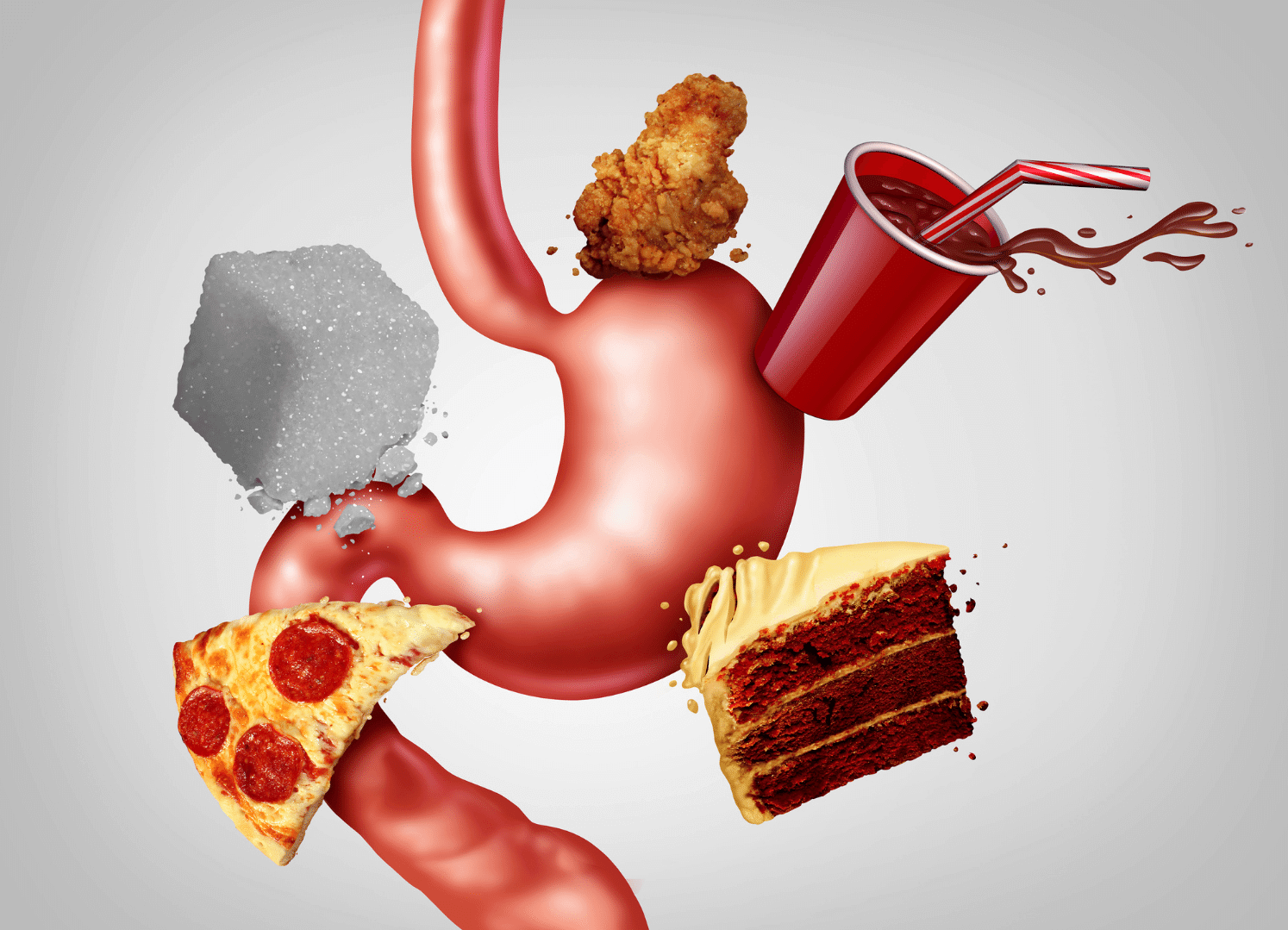
Food, Supplement, and Lifestyle Factors that Deplete Magnesium
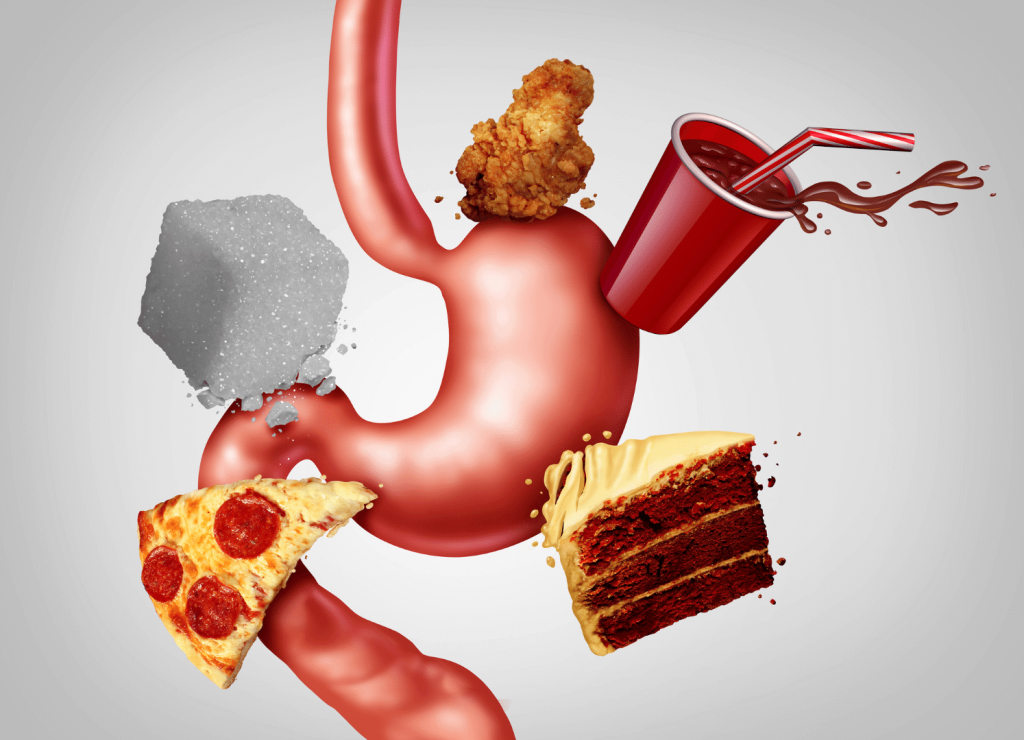

Food, Supplement, and Lifestyle Factors that Deplete Magnesium
Many factors beyond magnesium intake can hinder absorption or increase magnesium loss. Recognizing these barriers is essential when addressing magnesium deficiency.
In this article, we will explore the impact of dietary choices and the various influences that prevent proper absorption or lead to magnesium depletion. By understanding these factors, you can take proactive steps to ensure optimal magnesium levels and promote overall well-being.
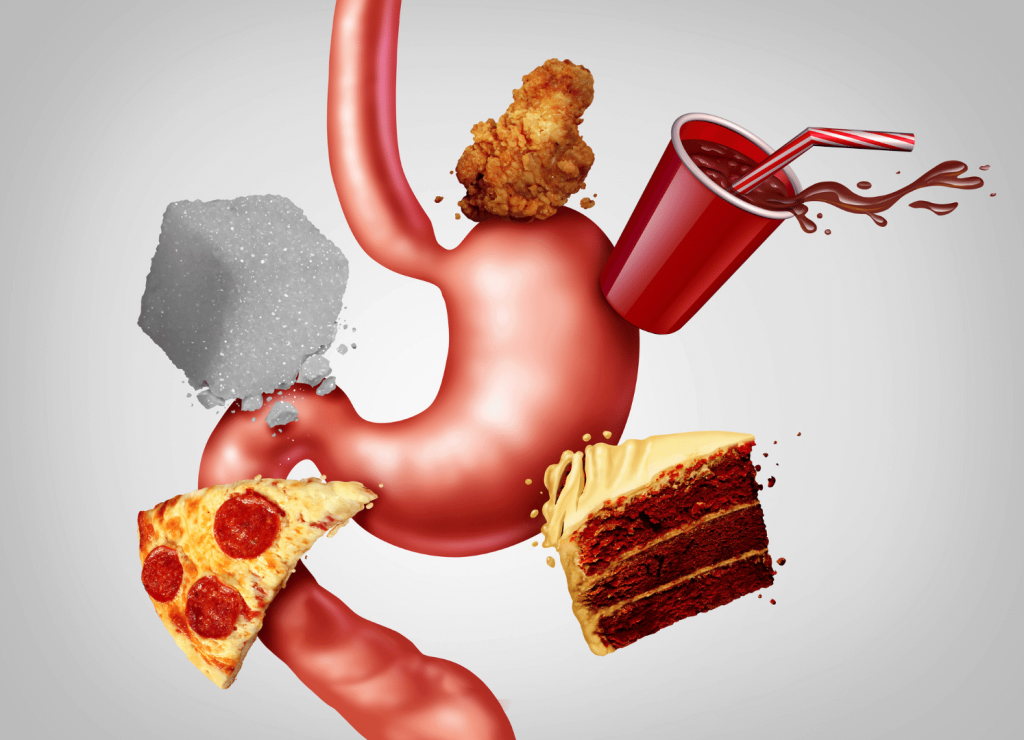
Foods That Deplete Magnesium Or Block Magnesium Absorption
High Anti-Nutrient Foods
Anti-nutrients are just as the name suggests. They’re compounds that can block you from absorbing nutrients. Specifically, phytic acid and oxalates can prevent magnesium absorption.
Phytic Acid
Phytic acid can hinder magnesium absorption in humans through a process called chelation. Chelation occurs when phytic acid binds to minerals like magnesium in the gut, forming magnesium phytates, which are insoluble and indigestible.
As a result, the magnesium phytate can go right through you and get eliminated with feces. This means that even if a food contains a good amount of magnesium, phytic acid can limit how much magnesium you absorb and use.
Some of the foods highest in phytates include:
- Nuts and seeds
- Legumes
- Beans
- Grains
If this list includes some of your favorite, and perhaps the healthiest, foods, have no fear. A few extra steps in the preparation process, like soaking, fermenting, and sprouting can reduce phytic acid.
Oxalates
Oxalates can also interfere with magnesium absorption. Foods particularly high in oxalates include:
- Spinach
- Beets
- Rhubarb
- Wheat bran
- Nuts
- Chocolate
- Tea
- Strawberries
Oxalates are negatively-charged compounds that attract positive ions like magnesium. When oxalates bind with magnesium, they form insoluble crystals called magnesium oxalate.
Oxalate primarily meets magnesium in the gut. When they bind tightly to each other (becoming magnesium oxalate) the magnesium becomes insoluble. Therefore, most of the magnesium oxalate passes through the gut unabsorbed.
A study of nine healthy adults compared the effects of a meal containing spinach (high oxalate content) versus a meal containing kale (low oxalate content) on magnesium absorption. Subjects ate meals of phytate-free bread with 300 grams of spinach and kale on separate days.
Magnesium absorption was significantly lower with the high oxalate meal. Subjects absorbed:
- 27% of the magnesium in the meal with spinach
- 36% of the magnesium in the meal with kale
Even with a 30% naturally higher magnesium of spinach compared to kale, subjects absorbed less magnesium with the spinach due to higher oxalate levels.
So, how can you reduce oxalates? Soaking and boiling are the most effective methods.
Soy
As soy becomes more popular, with many embracing it as a dairy substitute and superfood, it’s essential to examine how this legume might impact nutrient absorption. It could be affecting your ability to absorb magnesium. Phytic acid makes up about two percent of soybeans and soy protein.
An animal study investigating the effects of dairy milk versus soy milk on magnesium absorption revealed intriguing results. Subjects were in one of two groups, one consuming dairy milk and the other consuming soy milk for four weeks. Upon analysis, the soy milk group exhibited consistently lower magnesium levels than the dairy milk group.
Interestingly, even with identical diets otherwise, those consuming soy milk absorbed less magnesium in the lower intestine. This suggests that factors inherent to soy milk, including phytic acid, may hinder magnesium absorption in the gut.
Individual variations in diet, overall nutrient intake, and health status can influence the magnitude of this impact. Additionally, exploring alternative food sources rich in magnesium and adopting strategies to minimize phytic acid content, such as fermentation or soaking, may help mitigate any potential issues associated with soy consumption.
Soda
Soda contains multiple ingredients that may impede your ability to absorb magnesium. Both fructose and phosphorus additives in soda can interfere with magnesium absorption and encourage magnesium excretion.
In a controlled animal study, subjects drank Coca-cola, 7Up, or Pepsi for four months. The animals drinking soda had reduced magnesium levels after just two weeks and even more after four months. The Coca-cola group lost the most magnesium.
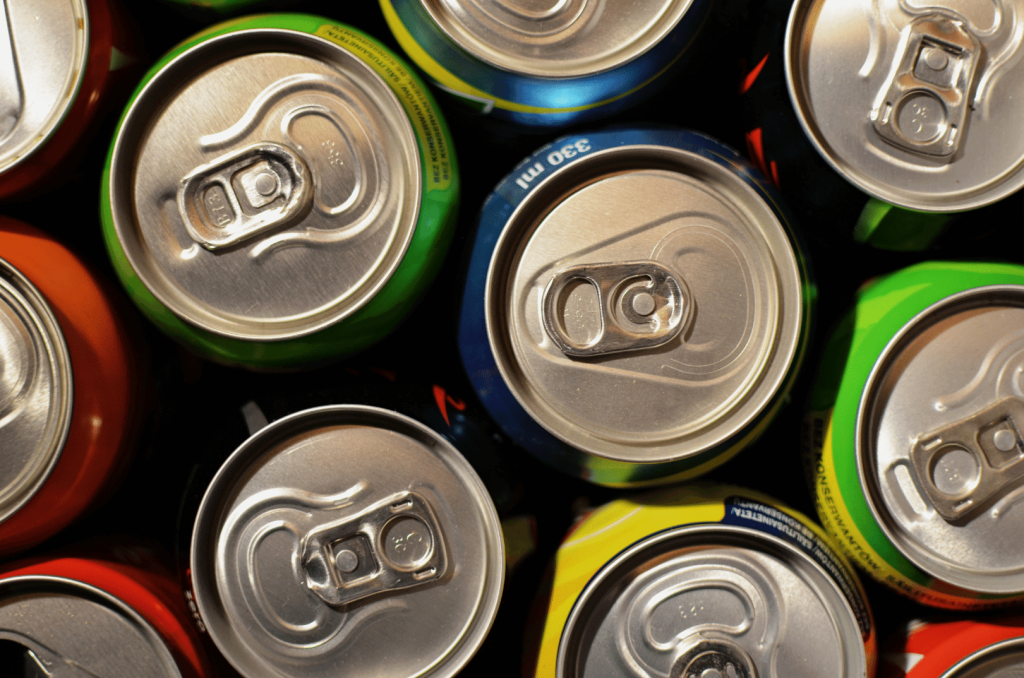
Processed Foods
Processed foods tend to have lower magnesium levels than whole, unprocessed foods. The processing methods of these foods often remove or reduce the natural magnesium content. This is particularly true for cereal grains like:
- Rice
- Oats
- Corn
- Wheat
While processed foods are often fortified with vitamins and minerals, magnesium is not one of
them.
Focus on consuming a balanced diet that includes a variety of whole, unprocessed foods. These whole foods naturally contain higher amounts of magnesium and provide additional health benefits beyond just the mineral content.
Caffeine
Drinking caffeine increases the amount of magnesium you excrete in your urine rather than absorbing it.
A controlled study of 17 healthy subjects followed identical magnesium-containing diets. Subjects consumed 3 mg/kg (2.2 lbs) of lean body mass at 7 am and again at 10 am. Urinary magnesium excretion was highest six hours following the second dose of caffeine and then began to decrease.
Your body has natural mechanisms to conserve minerals like magnesium at night. However, these efforts aren’t enough to offset the mineral losses caused by consuming caffeine in the morning. Simply put, when you consume caffeine in the morning, your body’s efforts to compensate for the increased loss of magnesium caused by caffeine are insufficient.
Protein
Eating a high-protein diet could be a factor in magnesium depletion. Protein metabolism produces sulfur-containing metabolites. These metabolites increase the acid load in the body.
When the body is in an acidic state, it tends to counterbalance the acidity by various mechanisms, one of which is the release of alkaline minerals like calcium and magnesium from bone tissue. These minerals act as buffers to neutralize excess acid and help maintain the body’s pH within a normal range. Unfortunately, it can also lead to magnesium depletion.
Other research suggests that eating a high-protein diet can increase magnesium absorption due to decreased loss via feces. So, what is the confusion? An animal study may shed some light on the discrepancy.
Animals were fed either a normal or high-protein diet that contained equal amounts of magnesium. The high-protein diet increased apparent magnesium levels measured by magnesium intake minus magnesium found in feces. This, however, was likely due to lower fecal excretion of magnesium.
When measuring the true magnesium absorption using a tracer isotope, researchers found no effect of the high-protein diet on magnesium levels.
The study suggesting a high-protein diet increases magnesium absorption measured magnesium levels in feces and urine. Those results likely only captured apparent magnesium absorption rather than true ones.
While further research is needed to fully understand the influence of a high-protein diet on your magnesium levels, it is something you should be aware of. Make sure to check your magnesium levels to determine whether this is a concern for you.
Supplements That Deplete Or Prevent Magnesium Absorption
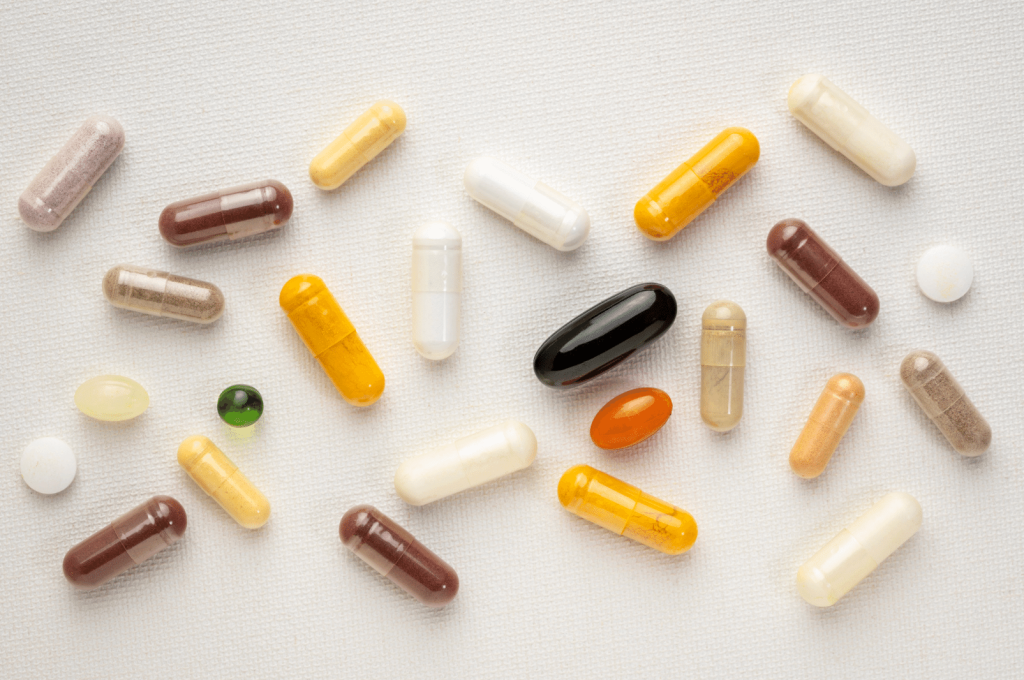
Vitamin D
Magnesium and vitamin D have an important relationship in your body. Magnesium helps activate vitamin D, keeping your bones strong and healthy. Once activated, vitamin D helps control your calcium and phosphate levels.
The enzymes that help process and activate vitamin D in your body need magnesium to work correctly. Magnesium acts like a helper for these enzymes, ensuring they can do their job effectively. However, correcting a vitamin D deficiency may increase magnesium absorption.
Because processing vitamin D requires a lot of magnesium, taking large doses (>4000 IU/day) of vitamin D for months or years can deplete magnesium. Animal studies also suggest that taking high doses increases the amount of magnesium in your urine, leading to depletion.
Rather than guessing whether or not your vitamin D levels are low, check your blood levels and work with a health practitioner to determine the appropriate vitamin D dosage.
Competing Minerals, Including Zinc And Calcium
Zinc
High doses of zinc supplements can interfere with the absorption of magnesium. This occurs because zinc and magnesium utilize similar transport mechanisms in the intestines. Consequently, excessive zinc intake may reduce magnesium absorption.
In a clinical trial of 21 healthy adult males, researchers wanted to explore the effects of zinc on magnesium absorption. Subjects took 142 mg of zinc with either 230, 500, or 800 mg of calcium daily. No matter the dose of calcium, zinc decreased both magnesium absorption and balance.
Participants taking the calcium/zinc supplements had more magnesium in their urine and feces. This finding suggests that the balance between magnesium (Mg) and zinc (Zn) in the intestine can affect the absorption of each mineral by the body.
Typically, the Mg/Zn ratio in the intestine is about 20:1, with about 50% of dietary magnesium absorption. However, when you have significantly more zinc, such as adding 142 mg of zinc, the Mg/Zn ratio changes to about 2:1. This change in ratio reduces magnesium absorption.
Calcium
Magnesium and calcium (Ca) are both critical for essential bodily functions. They share a regulating system and receptors involved in maintaining balance. However, Mg and Ca can also oppose each other.
Transporters for Mg also attract calcium. These transporters are proteins that help facilitate the movement of ions, such as Mg and Ca, across cell membranes. This potentially influences Ca and Mg absorption and distribution within the body and can lead to competition in the intestines for absorption.
Researchers believe that the concentration of Ca and Mg in your body affects their absorption. When there is a low concentration of Ca and a high concentration of Mg, the transport of Mg is activated. On the other hand, a high intake of Ca can reduce the absorption rates of both Ca and Mg.
This is how it works. The ratio of Ca to Mg in the diet influences their absorption and effects on the body. When the body needs to absorb a total of ten ions of Ca and Mg and the diet contains five ions of each, it absorbs all five ions of each mineral. However, when you have a lot more of one and less of the other, such as if the diet has 45 ions of Ca and five ions of Mg, the body absorbs only nine Ca ions and one Mg ion.
Research tells us that the optimal ratio for taking calcium and magnesium is 2:1 (for example, 1,000 mg of Ca to 500 g of Mg)
Lifestyle Factors That Can Reduce Magnesium
Lifestyle factors play a significant role in our overall health, including magnesium levels in our bodies. However, certain lifestyle factors can contribute to a reduction in magnesium levels. Understanding how these lifestyle factors affect magnesium levels is crucial for maintaining optimal health and ensuring optimal magnesium levels.
Alcohol
Drinking alcohol rapidly increases magnesium excretion in your urine by about 167% – 260%. Researchers believe this magnesium comes from your body’s stores. If you already have lower magnesium levels, you won’t excrete as much as if you had higher levels.
A study of 24 men compared the magnesium status of alcohol drinkers and non-drinkers. While all participants consumed an equal amount of dietary magnesium, those who drank alcohol urinated out more magnesium.
The researchers suggest alcohol interferes with magnesium reabsorption from your urine into your blood. So, your kidneys leave more magnesium in your urine for excretion.

Medication
Some medications use the same pathways in your body to be absorbed, processed, and removed as magnesium. Because of this, when you take medication, there is a chance that it can interact with your magnesium levels. It’s actually a two-way street. Drugs can affect how well your body absorbs magnesium, and magnesium can affect how drugs work. Some of these interactions may be life-threatening.
Therefore, you should always check with your physician or pharmacist before introducing a new supplement, especially if you’re on medications.
Diuretics
Thiazide diuretics and loop diuretics are medications that can affect the levels of magnesium in your body in different ways.
Thiazide diuretics reduce the activity of a protein channel called TRPM6 in the kidneys. This channel helps in reabsorbing magnesium from the urine back into the body. With reduced TRPM6 expression, the kidneys don’t hold on to as much magnesium, causing more magnesium loss through urine.
Loop diuretics affect magnesium in a different part of the kidney. They reduce magnesium reabsorption through a pathway called the thick ascending limb in the kidney. This leads to magnesium loss through urine.
Both diuretics can cause a condition called secondary hyperaldosteronism. The hormone aldosterone, which helps regulate magnesium levels, becomes more active. The increased aldosterone levels further promote magnesium loss through urine.
Both types of diuretics can disrupt the balance of magnesium in our bodies and reduce magnesium levels.
Antacids
While researchers are still studying the effects of antacids on magnesium absorption, we know that they likely cause magnesium deficiency. Researchers identified some of the mechanisms involved.
One possible mechanism is passive absorption, which involves the movement of magnesium through small openings between cells in the intestinal wall. Antacids may disrupt these openings, reducing the amount of magnesium absorbed into the bloodstream.
Another possible mechanism involves active absorption, which relies on the protein channels we already discussed, especially TRPM6 and TRPM7. These channels help transport magnesium from the intestines into the body. Antacids could interfere with the functioning of these channels, making magnesium absorption harder.
Oral Contraceptives
Taking estrogen-containing oral contraceptives can decrease your magnesium levels by encouraging excretion. A study of over 2,000 women found that 67% of those taking contraceptives were magnesium deficient.
Another study of 100 women explored the effects of contraceptives on magnesium levels. Those taking contraceptives had significantly lower magnesium levels than the control group. Those taking oral contraceptives had the lowest magnesium levels. Additionally, researchers found that the longer women take contraceptives, the greater the magnesium deficiency.
Antibiotics
A particular family of antibiotics called aminoglycosides can impact your magnesium levels. They are broad-spectrum antibiotics most commonly prescribed to children. They include antibiotics such as:
- Gentamicin
- Amikacin
- Tobramycin
- Neomycin
- Streptomycin
Like other medications already discussed, aminoglycoside antibiotics can interfere with magnesium reabsorption in the kidneys, resulting in increased renal magnesium loss. They may also induce secondary hyperaldosteronism, contributing to lower levels of magnesium in the body. Magnesium may also reduce the absorption of antibiotics.
Conclusion
Maintaining optimal magnesium levels is crucial for overall well-being, but various factors can hinder absorption or contribute to magnesium depletion. To address magnesium deficiency, it is important to consider the following:
- Take your main sources of magnesium away from foods that deplete or hinder its absorption, such as foods high in phytic acid and oxalates.
- Be cautious with supplements that can deplete or hinder magnesium absorption, such as high doses of vitamin D and excessive zinc intake.
- Reduce or eliminate processed foods and soda from your diet.
- Limit your caffeine and alcohol consumption.
- Consider the impact and interactions of medications on magnesium levels, such as diuretics, antibiotics, and oral contraceptives. If you’re on medication, always speak to your doctor before introducing supplements.
- Supplement with a high-quality magnesium supplement like Magnesium Breakthrough to help address deficiencies.
To better understand your magnesium levels, see your health practitioner to have your levels tested and work on a plan together to reach optimal levels.
References
- Schuchardt JP, Hahn A. Intestinal absorption and factors influencing bioavailability of magnesium- an update. Curr Nutr Food Sci. 2017;13(4):260. doi:10.2174/1573401313666170427162740
- Schlemmer U, Frølich W, Prieto RM, Grases F. Phytate in foods and significance for humans: food sources, intake, processing, bioavailability, protective role and analysis. Mol Nutr Food Res. 2009;53 Suppl 2(S2):S330-75. doi:10.1002/mnfr.200900099
- Samtiya M, Aluko RE, Dhewa T. Plant food anti-nutritional factors and their reduction strategies: an overview. Food Prod Process and Nutr. 2020;2(1). doi:10.1186/s43014-020-0020-5
- Massey LK, Roman-Smith H, Sutton RA. Effect of dietary oxalate and calcium on urinary oxalate and risk of formation of calcium oxalate kidney stones. J Am Diet Assoc. 1993;93(8):901-906. doi:10.1016/0002-8223(93)91530-4
- Melse-Boonstra A. Bioavailability of micronutrients from nutrient-dense whole foods: Zooming in on dairy, vegetables, and fruits. Front Nutr. 2020;7:101. doi:10.3389/fnut.2020.00101
- Bohn T, Davidsson L, Walczyk T, Hurrell RF. Fractional magnesium absorption is significantly lower in human subjects from a meal served with an oxalate-rich vegetable, spinach, as compared with a meal served with kale, a vegetable with a low oxalate content. Br J Nutr. 2004;91(4):601-606. doi:10.1079/BJN20031081
- Petroski W, Minich DM. Is there such a thing as “anti-nutrients”? A narrative review of perceived problematic plant compounds. Nutrients. 2020;12(10):2929. doi:10.3390/nu12102929
- Deak NA, Johnson LA. Fate of phytic acid in producing soy protein ingredients. J Am Oil Chem Soc. 2007;84(4):369. doi:10.1007/s11746-007-1050-8
- Brink EJ, Dekker PR, van Beresteijn EC, Beynen AC. Bioavailability of magnesium and calcium from cow’s milk and soya-bean beverage in rats. Br J Nutr. 1992;68(1):271-282. doi:10.1079/bjn19920084
- Publication : USDA ARS. Usda.gov. Accessed June 22, 2023. https://www.ars.usda.gov/research/publications/publication/?seqNo115=105225
- Harmful effects of chronic consumption of soft drinks on the bone metabolism of laboratory female rats. Jnsbm.org. Accessed June 22, 2023. https://jnsbm.org/menuscript/index.php/submissions/article/view/135
- Rosanoff A, Kumssa DB. Impact of rising body weight and cereal grain food processing on human magnesium nutrition. Plant Soil. 2020;457(1-2):5-23. doi:10.1007/s11104-020-04483-7
- Kynast-Gales SA, Massey LK. Effect of caffeine on circadian excretion of urinary calcium and magnesium. J Am Coll Nutr. 1994;13(5):467-472. doi:10.1080/07315724.1994.10718436
- Workinger JL, Doyle RP, Bortz J. Challenges in the diagnosis of magnesium status. Nutrients. 2018;10(9):1202. doi:10.3390/nu10091202
- Rylander R. High protein, low carbohydrate, and mineral balance. Am J Clin Nutr. 2011;93(5):1152; author reply 1153. doi:10.3945/ajcn.111.012583
- Schwartz R, Walker G, Linz MD, MacKellar I. Metabolic responses of adolescent boys to two levels of dietary magnesium and protein. I. Magnesium and nitrogen retention. Am J Clin Nutr. 1973;26(5):510-518. doi:10.1093/ajcn/26.5.510
- Verbeek MJ, Van den Berg GJ, Lemmens AG, Beynen AC. High protein intake raises apparent but not true magnesium absorption in rats. J Nutr. 1993;123(11):1880-1887. doi:10.1093/jn/123.11.1880
- Uwitonze AM, Razzaque MS. Role of magnesium in vitamin D activation and function. J Am Osteopath Assoc. 2018;118(3):181-189. doi:10.7556/jaoa.2018.037
- Pointillart A, Denis I, Colin C. Effects of dietary vitamin D on magnesium absorption and bone mineral contents in pigs on normal magnesium intakes. Magnes Res. 1995;8(1):19-26.
- Hardwick LL, Jones MR, Brautbar N, Lee DBN. Magnesium absorption: Mechanisms and the influence of vitamin D, calcium and phosphate. J Nutr. 1991;121(1):13-23. doi:10.1093/jn/121.1.13
- Spencer H, Norris C, Williams D. Inhibitory effects of zinc on magnesium balance and magnesium absorption in man. J Am Coll Nutr. 1994;13(5):479-484. doi:10.1080/07315724.1994.10718438
- Dai Q, Shu XO, Deng X, et al. Modifying effect of calcium/magnesium intake ratio and mortality: a population-based cohort study. BMJ Open. 2013;3(2):e002111. doi:10.1136/bmjopen-2012-002111
- DeLuccia R, Cheung M, Ng T, Ramadoss R, Altasan A, Sukumar D. Calcium to magnesium ratio higher than optimal across age groups (P10-100-19). Curr Dev Nutr. 2019;3(Suppl 1):nzz034.P10-100-19. doi:10.1093/cdn/nzz034.P10-100-19
- Rivlin RS. Magnesium deficiency and alcohol intake: mechanisms, clinical significance and possible relation to cancer development (a review). J Am Coll Nutr. 1994;13(5):416-423. doi:10.1080/07315724.1994.10718430
- Rylander R, Mégevand Y, Lasserre B, Amstutz W, Granbom S. Moderate alcohol consumption and urinary excretion of magnesium and calcium. Scand J Clin Lab Invest. 2001;61(5):401-405. doi:10.1080/003655101316911459
- Gröber U. Magnesium and drugs. Int J Mol Sci. 2019;20(9):2094. doi:10.3390/ijms20092094
- Blinov DV, Ushakova TI, Makatsariya NA, Khamani NM, Bitsadze VO, Dadak C. Hormonal contraception and magnesium deficiency: A subanalysis of the magyn study. Obstet Gynecol Reprod. 2017;11(1):36-48. doi:10.17749/2313-7347.2017.11.1.036-048
- Akinloye O, Adebayo TO, Oguntibeju OO, Oparinde DP, Ogunyemi EO. Effects of contraceptives on serum trace elements, calcium and phosphorus levels. West Indian Med J. 2011;60(3):308-315.
